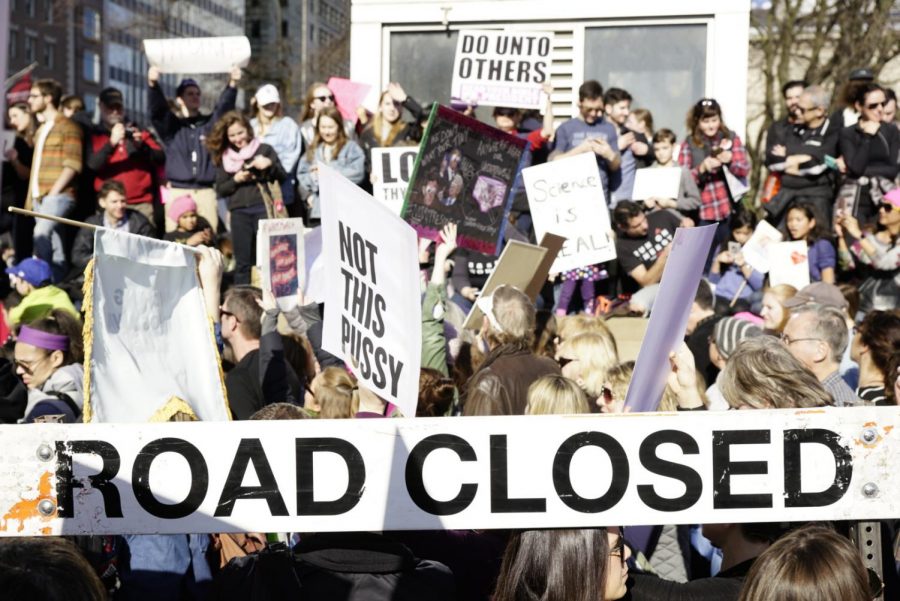Chicago organizes largest Women’s March outside of DC
January 21, 2017
Signs read, “The future is still female,” “Women’s rights=human rights” and “Trans power” at the Women’s March in Chicago.
Despite the unseasonably warm weather, many were wearing “pussy hats,” a popular hat pattern created by the Pussy Hat Project that people made and donated for participants nationwide to wear. All were gathered for the local Women’s March held on Jan. 21 in solidarity with the Women’s March on Washington as well as marches in all 50 states and 60 other countries.
Lori Lewis, a 29-year-old Chicagoan, said the only thing to which she could compare the Women’s March was attending former President Barack Obama’s victory speech in Grant Park in 2008.
“It feels exactly like it,” Lewis said.
The Women’s March on Washington was originally organized in response to the election of President Donald Trump as a way for marginalized groups to voice concerns about his presidency, and the idea of the march quickly spread to cities across the country and the world, including Chicago.
The Chicago Women’s March had an estimated 250,000 attendees at its peak, which would make it the largest estimated gathering outside of Washington D.C., according to several reports.
The rally began with a lineup of speakers including members of the Hamilton Chicago cast, aldermen, representatives from the ACLU and Planned Parenthood, the lead organizer of Black Lives Matter Chicago, and So Chi Voices.
“As a child I loved Wonder Woman, but nothing could have ever prepared me for standing here before 150,000 of them,” said one of the speakers Channyn Lynne Parker, a transgender activist and project manager for TransLife.
During the rally, organizers said due to the volume of people, there would be no march, but the rally would continue.
“The good news is, Chicago is shut down for peace,” an organizer told the crowd. “We have actually flooded the route, which puts a little damper on the march.”
However, by 12 p.m., many of the marchers had taken to the streets while the rally continued.
“The reason people came out of the rally spot was because we thought it was over, but then we were very happy to see Michigan Avenue closed down,” said Laura Miller Hill, a 55-year-old who works for a school district in St. Charles, Illinois, and who left the rally to march as planned. “That’s why we are here: to march.”
Many demonstrators could also not make it into the rally due to the high volume of people but still stood on the outskirts of Grant Park to show their support for the movement and opposition to Trump’s inauguration.
Deb Toppel, a 57-year-old from Lindenhurst, Illinois, said she could not sit idly by and ignore the current political climate, especially because she thinks complacency was one of the factors that led to Trump’s election.
“If not me, who?” Toppel said. “It is vital to stand up.”
Kelly Hayes, one of rally speakers and a native, disabled, queer woman and co-founder of the Lifted Voices collective, commended the organization of the march and the immense attendance but encouraged people to step outside of the march and continue to fight for their rights.
“While this convergence should be celebrated, it is a moment not a movement,” Hayes said. “A movement happens when we keep it going.”








